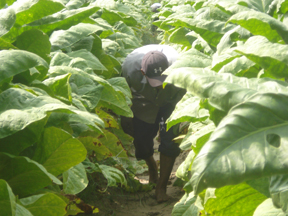The “Harvest of Shame” continues
 Monday, December 6, 2010 at 4:45PM by
Monday, December 6, 2010 at 4:45PM by  Chris Liu-Beers
Chris Liu-Beers Originally posted at NC Policy Watch
While the modern landscape of North Carolina agriculture may not, at first glimpse, look very "modern," many of our local growers are, in fact, now operating in a new global agribusiness paradigm.
Yes, it's true that many of the same crops are still grown on the same land, using many of the same methods. They are still planted by hand, and harvested by hand, as they have been since the time slaves were doing that work. But don't get caught up in nostalgic notions of the preservation of small, family farms-today the name of the game is, overwhelmingly global, agribusiness; factories in the fields.
This is illustrated by the new effort to market the North Carolina sweet potato to European supermarkets. As recently reported by the AP , "the value of exports to the United Kingdom jumped from $5.7 million to $20.4 million between 2005 and 2009, and in the first six months of 2010 exports were on pace to comfortably exceed last year's total, according to the U.S. Department of Agriculture."
Further evidence of this shift can be seen in the sustained, heavy reliance by local farms on a vulnerable, immigrant workforce from the global south. Increasingly, US agricultural products are being "branded" for the global marketplace, and yet farm labor conditions remain hidden within this new marketing scheme.
It's been half a century since Edward R. Murrow's Harvest of Shame documentary aired on CBS, revealing the plight of migrant field workers and making a strong call to civil society for change. Murrow highlighted the "backwardness" of the extreme, systemic poverty of field workers, asking us how, in this great, modern nation, could this be happening? And 50 years later, the agricultural industry is still just as important to our national and state economies. Yet it still relies on a system of vulnerable, exploitable workers to hand-harvest crops. Murrow's concerns clearly have still yet to be addressed.
The global forces affecting North Carolina agriculture nonetheless offer new challenges and new opportunities to address some of the age-old problems that continue to exploit and degrade the environment and workers. Indeed, as agribusiness reaches out to new markets, it also changes the distribution of power within the system.
For example, if North Carolina growers wish to market their sweet potatoes to a European market, they will have to meet new health and safety standards of the European supermarket chains. This is one example of new possibilities for points of leverage, to again force the question (albeit rephrased and to a new audience) of how can this be happening here?
Recently, the Farmworker Advocacy Network (FAN), held a series of events around North Carolina to kick-off the 'Harvest of Dignity' Campaign, which seeks to improve the laws protecting farmworkers. FAN is a coalition of organizations that work with farmworkers directly or work around issues affecting farmworkers.
The group's message is simple and straightforward: 50 years is far too long to wait for change. Change is badly and outrageously overdue, even more so now in the new, global agriculture system. And while many would agree that a complete overhaul is what's truly needed, what workers are asking for is relatively quite plain and simple: Just the basics.
Safe places to work: Enact basic health and safety standards to protect field and poultry workers from injury, illness and toxic chemical exposure on the job. Poultry processing plants should be required to keep line speeds safe.
Safe places to live: Require employer-provided housing to be safe, sanitary and provide for basic decency, such as privacy in bathrooms and locks on the doors.
Better enforcement of existing laws: Require state agencies to work together to enforce our state's current laws protecting field and poultry workers. Crack down on repeat offenders who ignore the law and put people in harm's way.
So, during this holiday season as you come together to celebrate over shared family meals, remember to thank the workers here in North Carolina who harvested your sweet potatoes, or worked on the line processing your turkey, that still do not have the basic rights that most workers take for granted.
It's time to stand in solidarity with these people to demand that 50 years is enough.
 Chris Liu-Beers
Chris Liu-Beers
This article also ran in the Dec. 16 edition of the Carrborro Citizen! Here's the link.










